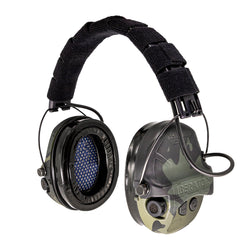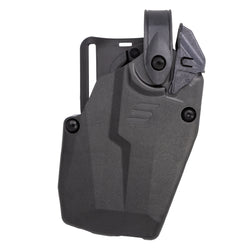Open carry laws are in the news right now, thanks to Gun Owners of America’s (GOA) lawsuit against Florida’s ban on the practice. Florida has banned open carry since 1893, affirmed by a 1987 statute, except in certain cases such as while lawfully hunting, fishing, camping, or target practice at an indoor range.
So, what is open carry? Which states allow it and under what circumstances? Where is it illegal? We’ll answer those questions, with a few caveats, below.

What is Open Carry?
The term “open carry” refers to publicly carrying a firearm that is completely or partially visible to others. But it’s not always that simple. Some open carry states require the gun to be fully visible to be considered “openly carried.” If the gun is only partially visible, the individual carrying that gun could be subject to concealed carry laws. That can be a big deal.
Other open carry states allow the gun to be only partially visible. My home state of Virginia allows open carry without a permit, but concealed carry requires a license. Virginia considers a gun that is visible to the casual observer to be “open carry.” That also applies if enough of the gun is visible that the casual observer knows it’s a gun, such as if only the grip is visible.
Here’s the first caveat. Every state is different in at least a few ways. And several states allow localities to enact their own gun ordinances affecting open and concealed carry. Those ordinances usually trip up out-of-town gun owners more than they deter crime, but I tend to believe that’s their main purpose anyway. But I digress.
There’s no way that I can include every detail from every state in an article like this. So, it’s up to you to know your state’s laws. Many states have organizations to help with that. For me, it’s the outstanding Virginia Citizens Defense League (VCDL). Many such groups have all their state’s gun and carry laws in one convenient place. Make use of them.

Open carry is somewhat controversial, even in the firearms world. We will address that in an upcoming article. For now, let’s look at the four categories of open carry laws, and where each state falls within them.
Open Carry Law Categories
The US Concealed Carry Association (USCCA) categorizes open carry laws like this:
Permissive Open Carry
These states allow people who can legally possess a firearm to openly carry a gun in public without a permit or license. Some states differ on whether and how these laws apply to long guns.
Licensed Open Carry or Not Addressed
Gun owners may openly carry a firearm only with a permit or license — or — state statutes do not directly address open carry, but a permit or license is required to carry a handgun. I strongly recommend that you clarify this situation with your local law enforcement agency before open carrying your firearm.
Anomalous Open Carry
Open carry may be legal under state law, but localities may have their own laws either prohibiting or limiting both open and concealed carry. Criteria for state residents may be different than for non-residents.
Non-Permissive Open Carry
Open carry is against state law or is severely restricted to certain circumstances such as hunting or when legally used for self-defense.
Age restrictions also vary by state.
The legal age for open carry is either 18 or 21 years old, except for New Mexico, which sets the age at 19. Some states whose age requirement is 21 make exceptions for military personnel, who may carry at age 18. Several states also restrict whether a firearm may be openly carried in a vehicle. Again, check your state’s laws.
Check the Map
The map below shows where each state falls on the category list above. My map differs from the USCCA’s, which you can find on their website. I categorize Virginia and North Carolina as Anomalous Open Carry states since localities can make their own, stricter, laws. The USCCA classifies them as Permissive Open Carry States. Pennsylvania is a Permissive Open Carry state, though open carry is banned in the City of Philadelphia.

California’s open carry laws are odd, as you might imagine. The state generally outlaws open carry, but the sheriffs of counties with less than 200,000 people may issue licenses to openly carry a loaded handgun. Such licenses are only valid within the borders of the issuing county.
Connecticut residents should open carry their firearms with caution. A state appellate court wrote that “[d]epending on the specific circumstances, a person who openly carries a pistol conceivably may be subject to arrest for violating several statutes, . . . even if § 29–35 does not prohibit a permit holder from carrying a pistol openly.” Pretty vague. Do as you will but understand what you’re potentially in for.
Hawaii’s open carry permits are only valid within the borders of the issuing county.
Washington, D.C. prohibits open carry.
Changing Open Carry Laws
Open carry laws are changing in some states, just as many states have moved toward Constitutional Carry. Texas is considered to be among the most permissive states when it comes to gun laws, but open carry only became legal in the last decade, after a long campaign to change the law.
Florida is also viewed as being very gun-friendly, recently becoming a Constitutional Carry state. But does Florida really fit that description if it still bans almost all open carry? As we noted, Florida only allows open carry if the person is engaged in fishing, lawful hunting, camping, or target practice at an indoor range. Outdoor ranges apparently don’t count.
Governor Ron DeSantis says he will sign an open carry bill if it reaches his desk, but the leaders of the Florida House and Senate, both Republicans, say they aren’t interested in passing, or even discussing, such a bill. GOA has sued, saying Florida’s law is unconstitutional under the Supreme Court’s Bruen Decision. We’ll see how it goes.
Know the Law
Once again, I cannot overemphasize the importance of knowing the law where you live or anywhere you travel. Florida, on the surface, is a Constitutional Carry state. It would be easy to assume that label includes open carry. If you don’t have a VCDL-like organization, check with your local sheriff or police department. Your state government website should also list the various state laws, but you’ll have to wade through them.
Just be aware that concealed carry laws and open carry laws are not necessarily the same thing and may not be covered by the same statute. You should also know the open carry category in which your state falls so that you’re aware of potential pitfalls like local ordinances. Don’t make the mistake of finding out about a law after you’ve run afoul of it.









